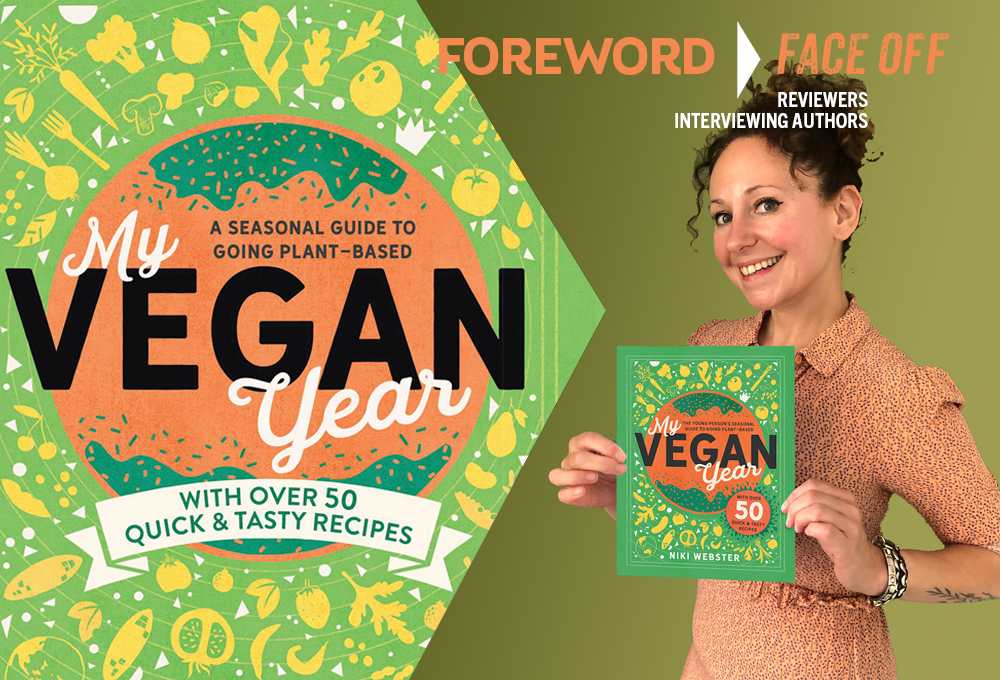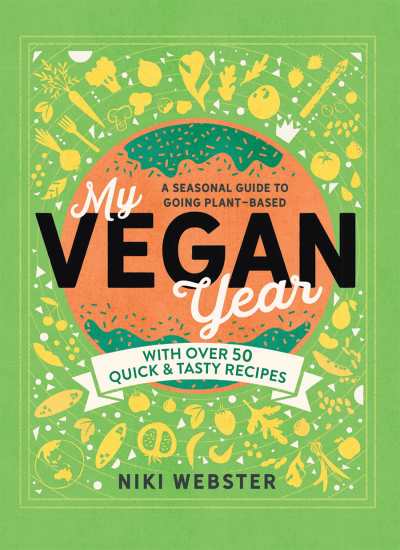Reviewer Rebecca Foster Interviews Niki Webster, Author of My Vegan Year: The Young Person’s Seasonal Guide to Going Plant-Based

Lifestyle changes are grueling because they call into question your most fiercely held practices and habits. It’s just not easy to ask your body to do something different after decades of doing it the same way. We get it.
But that’s no reason not to try, especially when the upsides—for you, for others, for the planet—are so positive. Should you be considering the ambitious decision to drop animal products from 
your diet, you’ll be pleased to hear we have Niki Webster with us to discuss her My Vegan Year: The Young Person’s Seasonal Guide to Going Plant-Based with reviewer Rebecca Foster.
One last thought: You will make a meaningful difference if you eat one less serving of meat this week … and the following week … and then, perhaps, two less servings a week the following month … and the following month …
Our point is that lasting change comes in small incremental steps—don’t bite off too much.
Can you tell us a bit about your own journey with veganism?
My journey didn’t really have an official start; instead, it evolved over time. But I suppose it really started with my refusal to eat meat as a little girl, combined with a dairy intolerance. This meant that from a really young age I was mainly eating a vegan diet, which wasn’t so easy or accepted back then. I started cooking for myself and experimenting in the kitchen as a teenager and finally discovered food I loved to eat and cook. Fast forward to 2016 and I’d been cooking and creating vegan recipes for many years and finally plucked up the courage to start a blog and social channels so that I could help other people create delicious, wholesome vegan recipes.
Thinking back just a decade or so, being vegan was something of a niche choice. Why and how has it gone mainstream so quickly?
It’s incredible to think that when I started my blog and called it “Rebel Recipes,” it was about rebelling against people’s preconceived ideas that vegan food was dull, boring, and tasteless. That was in 2016 and so much has changed since then. The world has finally realized that there are so many benefits to following a vegan diet or simply reducing meat consumption. These range from animal welfare to health concerns, but mainly, I would say, it’s the positive impact on the environment. People want to know where their food is coming from and its impact on the planet. This has started with what we eat, something tangible that people can change, but it’s expanding to other areas rapidly, too.
This is your third book and the second one geared towards teenagers. What, in particular, drives teens to veganism these days?
I believe environmental concerns are one of the primary motivations for teenagers considering going vegan. Thankfully, there’s now much more awareness around climate change and an understanding that reducing meat consumption is key to combating this. I think that teenagers believe that even small personal changes can make an impact and they want to do so. Animal welfare is also a huge consideration in the decision to go vegan, as well as health. It’s all a personal choice, and everyone has their own reasonings, beliefs, and motivators in order to do so.
To what extent is veganism a mindset or a lifestyle rather than a simple matter of food decisions? Do you think that it’s different to other diets in that way?
To be vegan is much more than following a particular diet. It’s a commitment to not cause harm to animals in any way. This means not eating meat but also not harming animals in any way, or form. Vegans don’t wear leather, silk, or wool and avoid anything containing animal-based products.
My Vegan Year is centered around the idea of seasonality. Why is this so important to you?
Eating seasonally means being more in tune with the seasons and traditional ways of eating. There are many benefits; here are my top reasons:
-
It tastes better and it’s fresher. Seasonal produce is usually grown closer to home, so it has less time in transit (which can cause a loss of flavor and nutrients).
-
You’re doing something for the planet—buying local and seasonal produce means fewer food miles. Food production and transport release greenhouse gases like carbon dioxide into the environment and can use precious fossil fuels, which also contribute to air pollution and global warming. So, eating seasonally and locally can help cut down on environmental impact.
-
You can support local small businesses and farmers—by buying from farmer’s markets or local shops you can help support your community.
-
It’s an opportunity to be creative. If you cook with what’s in season, it forces you to create dishes centered around the available produce.
There’s a focus on the visuals in this cookbook. Who did you work with on the graphics and layout, and what was your input on how you wanted the book to look?
The lovely visuals for this book were created by Anna Stiles, as for Be More Vegan. I think they really bring the book to life and add so much character and personality. The overall look is very much a collaborative process between myself and Welbeck.
Do you have a favorite recipe or two here?
I really love many recipes from this book, but if I have to pick a favorite … I’d say the sticky ginger cake. It’s amazing! During my recipe testing process, I had multiple friends and family stop round asking if I could bake them one as well. I think I made more ginger cake than anything else! Also, the Kati Rolls (spicy Indian crêpes filled with chickpeas and spinach), I could live off of them!
Rebecca Foster
